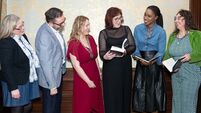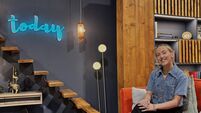Sharing their stories with Cork students at I WISH

THOUSANDS of Transition Year girls and their teachers from throughout Cork will hear why they need to step up, and get stuck into STEM (Science Technology Engineering Mathematics) at an event in Cork City Hall.
The annual I WISH conference takes place at the venue from February 7 to 8, and in Dublin’s RDS, on February 11 and 12. It is designed to inspire young women to take STEM subjects to Leaving Cert level and beyond, into college and employment.
It was founded four years ago by Cork-based Caroline O’Driscoll (Tax Partner at Deloitte), Ruth Buckley (Cork City Council), and Gillian Keating (RDJ Solicitors). In the first year they brought 1,000 female students to City Hall in Cork. Having expanded to Dublin two years ago also, they have now reached out to 12,000 students and hope to increase this in 2019.
This year’s event comprises workshops, keynote addresses and interactive exhibitions. Among the high profile industry speakers in Cork are comedian and physicist Dr Jessamyn Fairfield and high profile entrepreneur Ciara Judge.
We caught up with them to hear what they think can be done about the ongoing problem of gender imbalance in the sector, and why girls need to make their voices heard now more than ever.

WE need women to help shape tomorrow’s innovations — if future technologies are designed and developed by both women as well as men, we will go a long way towards creating the equal, progressive society that we’re all striving for.
That’s according to Kirsten Cox, Vice President of Marketing, EMEA at software giants VMware, who has been working in technology for more than 20 years.
At the I Wish event, she’ll be urging the young women to have an open mind and ignore any preconceptions they may have about what a career in the tech industry could entail.
“It’s an incredibly exciting time to be involved and I’d love to inspire more young women to become part of it,” she said.
However, she’s firmly of the opinion that women are still seriously underrepresented within STEM — and a change in mindset is absolutely key to get past that.
“There’s still a perception that STEM is a male-dominated profession and requires technical or scientific qualifications. But the industry is so much broader than that.
“There are a whole range of non-technical roles available which are just as important, if not more, than technical ones.
“As an industry, we need to help show youngsters that side of the business and demonstrate how fundamental they are to businesses delivering growth and social change.
“In doing so, we need to make sure we increase young women’s exposure to these opportunities and explain them in a way that young girls understand. For too long we have wondered why women’s uptake of STEM roles has been lower than expected. We need to get on the front foot and have these conversations at an early age so they can consider the opportunities that exist for them in a future career.”
She said the STEM industry would undoubtedly benefit from more of the softer skills women can bring to the workplace.
“We are great at communicating, collaborating and networking — skills which are critical to effective leadership and management — and studies by the likes of LinkedIn indicate that these soft skills are already the top priority for businesses. STEM firms therefore need to catch up with other industries and reap the benefits of diversity and gender equality in the workplace.”
But she said female involvement in the sector was more important than that — pursuing a career in STEM provides young women with the chance to help shape our future through the power of technology.
“As many organisations begin to experiment with technologies such as AI and machine learning, it’s essential that women are as integral as men in developing them to prevent any inherent bias from infiltrating these platforms. They are going to form a pivotal part of our future, and women have a critical role in ensuring they help promote equality and drive positive change.”

IDEALLY, gender shouldn’t matter in your career of choice and hopefully in the future it will matter less and less. In the meantime I am happy to help promote and highlight to current students what a career in STEM can look like.
And in the case of Dr Fiona Edwards Murphy, it sees her travelling the world visiting almond and blueberry farms in America and South Africa, helping beekeepers keep their bees healthy and safe, and monitoring 10 million bees from her Cork headquarters.
Fiona, from Kanturk, is CEO of ApisProtect (Apis is the latin word for bee.)
Growing up, she had a love of animals (her grandfather introduced her to the world of bees) as well as technology but never thought she would combine the two.
But that’s exactly what she does; having devised technology to help beekeepers manage their hives and keep their bees, which are under global threat from a range of diseases and pests, healthy.
“We use sensors to monitor honey bees in the hive,” said Fiona. “We collect temperature, humidity, CO2, sound, and movement data from a single sensor unit installed inside the hive, called the ApisMonitor.
“We collect data from beehives all over the world using a combination of different long-range networks to bring these data together on our servers.
“There, we use ‘Machine Learning’ technology to process and convert overwhelming amounts of raw data into actual information a beekeeper can use.”
Her passion has always been to use science to solve issues that have impacted on people’s daily lives.
“One of my projects in college was to look at the safety of bridges and tunnels being built in Switzerland and Italy to ensure the safety of workers whilst these projects were under construction. I also worked on an e-health project helping doctors remotely detect pre-eclampsia in women in Africa using blood pressure sensors.
“In 2012 and 2013, I saw how beekeepers all over the world were concerned about colony collapse disorder and how that affected bees, and wondered if anyone had looked into putting sensors into beehives. A little bit of research showed there had been some work in the area but nothing extensive so I decided to focus my PhD there. After discussing my PHD in a radio interview, beekeepers all over Ireland, and internationally, started getting in touch looking for this technology.
“My co-founders and I decided to start our company, ApisProtect, to see if we could bring this project to life.”
Fiona said the she firmly believes technology should be compulsory in schools to ensure students are ready for the technology jobs of the future.
“Participating in events like I WISH is really important to me, I want to share my story with students to give them some insight into the opportunities available to them Technology is now such a fundamental part of our lives, there are no jobs that students will grow up and do that won’t involve apps, computers, software and things like that, so it is vitally important that girls are studying STEM subjects to ensure they can have the best career to suit them in their future.”
Essentially, her advice is: “If you do enjoy science and technology, follow this interest; it is such an interesting area to work in, with new developments all the time. We all use and benefit from technology every day, it will be fascinating to see the new technologies of the future and how they will make a difference to all areas in our lives.”



I WISH runs at Cork City Hall on February 7 and 8 and at RDS in Dublin on February 11 and 12. See www.iwish.ie for more about the events.







 App?
App?


